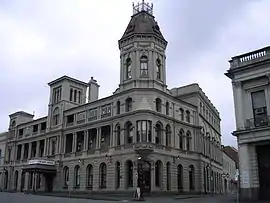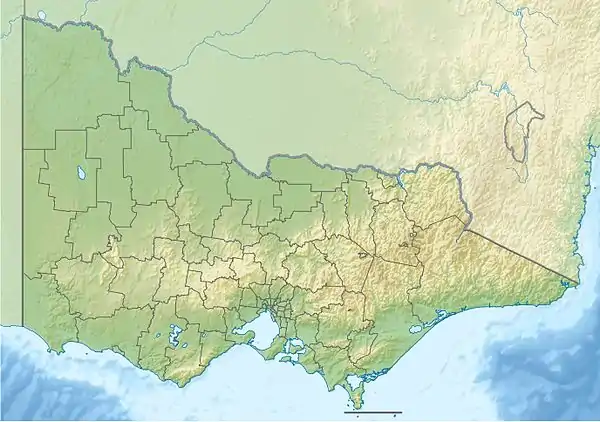Grampians (region)
The Grampians is an economic rural region[1] located in the western part of Victoria, Australia. The 48,646-square-kilometre (18,782 sq mi) region lies to the northwest of the western suburbs of Greater Melbourne, to the state's western border with South Australia and includes the Grampians National Park and significant gold mining heritage assets. The Grampians region has two sub-regions, Grampians Central Highlands and Wimmera Southern Mallee.[2]
| Grampians Region Victoria | |||||||||||||||
|---|---|---|---|---|---|---|---|---|---|---|---|---|---|---|---|
 Craigs Hotel, Lydiard Street, Ballarat. | |||||||||||||||
 Grampians Region The location of Grampians National Park, within the Grampians region | |||||||||||||||
| Coordinates | 37°16′S 142°26′E | ||||||||||||||
| Population | 236,739 (2016 census)[Note 1] | ||||||||||||||
| • Density | 4.86657/km2 (12.60435/sq mi) | ||||||||||||||
| Area | 48,646 km2 (18,782.3 sq mi) | ||||||||||||||
| Time zone | AEST (UTC+10) | ||||||||||||||
| • Summer (DST) | AEDT (UTC+11) | ||||||||||||||
| Location | 200 km (124 mi) W of Melbourne | ||||||||||||||
| LGA(s) | |||||||||||||||
| State electorate(s) | |||||||||||||||
| Federal Division(s) | |||||||||||||||
| |||||||||||||||
As at the 2016 Australian census, the Grampians region had a population of 236,739, with almost half of the population located in the City of Ballarat. The principal centres of the region, in descending order of population, are Ballarat, Bacchus Marsh, Horsham, Ararat, and Stawell.
Administration
Political representation
For the purposes of Australian federal elections for the House of Representatives, the Grampians region is contained within all or part of the electoral divisions of Ballarat,[3] Corangamite,[4] Mallee,[5] and Wannon.[6]
For the purposes of Victorian elections for the Legislative Assembly, the Grampians region is contained within all or part of the electoral districts of Buninyong, Lowan, Melton, Mildura, Murray Plains, Polwarth, Ripon and Wendouree.
Local government areas
The region contains eleven local government areas, which are:
| Local government area | Area | Population (2011 census) |
Source(s) | Population (2016 census) |
Source(s) | |
|---|---|---|---|---|---|---|
| km2 | sq mi | |||||
| Rural City of Ararat | 4,230 | 1,630 | 11,183 | [7] | 11,600 | [8] |
| City of Ballarat | 740 | 290 | 93,501 | [9] | 101,686 | [10] |
| Golden Plains Shire | 2,704 | 1,044 | 18,770 | [11] | 21,688 | [12] |
| Shire of Hepburn | 1,470 | 570 | 14,367 | [13] | 15,330 | [14] |
| Shire of Hindmarsh | 7,527 | 2,906 | 5,798 | [15] | 5,721 | [16] |
| Rural City of Horsham | 4,249 | 1,641 | 19,279 | [17] | 19,642 | [18] |
| Shire of Moorabool | 2,110 | 810 | 28,124 | [19] | 31,818 | [20] |
| Shire of Northern Grampians | 5,918 | 2,285 | 11,845 | [21] | 11,439 | [22] |
| Shire of Pyrenees | 3,433 | 1,325 | 6,669 | [23] | 7,238 | [24] |
| Shire of West Wimmera | 9,107 | 3,516 | 4,251 | [25] | 3,903 | [26] |
| Shire of Yarriambiack | 7,158 | 2,764 | 7,088 | [27] | 6,674 | [28] |
| Totals | 48,646 | 18,782 | 220,875 | 236,739 | ||
Food and Wine Festival
The Grampians Region is home to one of Australia's longest running food and wine festivals, Grampians Grape Escape, held over the first weekend of May in Halls Gap every year. Launched in 1992, the Grampians Grape Escape is a hallmark event for Victoria and provides food and wine offerings by more than 100 local artisan producers, live music and family entertainment.[29]
Environmental protection
The Grampians region contains the Grampians National Park and Little Desert National Park.
Notes
- Population figure is the combined population of all LGAs in the region
References
- "Meaning of Regional Victoria". Department of State Development, Business and Innovation (MS Word requires download). State Government of Victoria. 2011. Archived from the original on 19 August 2014. Retrieved 15 August 2014.
- "Victoria's Grampians Region". Regional Development Victoria. State Government of Victoria. 8 May 2014. Retrieved 10 August 2014.
- "Profile of the electoral division of Ballarat (Vic)". Current federal electoral divisions. Australian Electoral Commission. 24 December 2010. Retrieved 8 August 2014.
- "Profile of the electoral division of Corangamite (Vic)". Current federal electoral divisions. Australian Electoral Commission. 24 December 2010. Retrieved 8 August 2014.
- "Profile of the electoral division of Mallee (Vic)". Current federal electoral divisions. Australian Electoral Commission. 24 December 2010. Retrieved 8 August 2014.
- "Profile of the electoral division of Wannon (Vic)". Current federal electoral divisions. Australian Electoral Commission. 24 December 2010. Retrieved 8 August 2014.
- Australian Bureau of Statistics (31 October 2012). "2011 Community Profiles: Ararat (RC) (Local Government Area)". 2011 Census of Population and Housing. Retrieved 8 August 2014.

- Australian Bureau of Statistics (27 June 2017). "2016 Community Profiles: Ararat (RC) (Local Government Area)". 2016 Census of Population and Housing. Retrieved 3 April 2018.

- Australian Bureau of Statistics (31 October 2012). "2011 Community Profiles: Ballarat (C) (Local Government Area)". 2011 Census of Population and Housing. Retrieved 8 August 2014.

- Australian Bureau of Statistics (27 June 2017). "2016 Community Profiles: Ballarat (C) (Local Government Area)". 2016 Census of Population and Housing. Retrieved 3 April 2018.

- Australian Bureau of Statistics (31 October 2012). "2011 Community Profiles: Golden Plains (S) (Local Government Area)". 2011 Census of Population and Housing. Retrieved 8 August 2014.

- Australian Bureau of Statistics (27 June 2017). "2016 Community Profiles: Golden Plains (S) (Local Government Area)". 2016 Census of Population and Housing. Retrieved 3 April 2018.

- Australian Bureau of Statistics (31 October 2012). "2011 Community Profiles: Hepburn (S) (Local Government Area)". 2011 Census of Population and Housing. Retrieved 8 August 2014.

- Australian Bureau of Statistics (27 June 2017). "2016 Community Profiles: Hepburn (S) (Local Government Area)". 2016 Census of Population and Housing. Retrieved 3 April 2018.

- Australian Bureau of Statistics (31 October 2012). "2011 Community Profiles: Hindmarsh (S) (Local Government Area)". 2011 Census of Population and Housing. Retrieved 8 August 2014.

- Australian Bureau of Statistics (27 June 2017). "2016 Community Profiles: Hindmarsh (S) (Local Government Area)". 2016 Census of Population and Housing. Retrieved 3 April 2018.

- Australian Bureau of Statistics (31 October 2012). "2011 Community Profiles: Horsham (RC) (Local Government Area)". 2011 Census of Population and Housing. Retrieved 8 August 2014.

- Australian Bureau of Statistics (27 June 2017). "2016 Community Profiles: Horsham (RC) (Local Government Area)". 2016 Census of Population and Housing. Retrieved 3 April 2018.

- Australian Bureau of Statistics (31 October 2012). "2011 Community Profiles: Moorabool (S) (Local Government Area)". 2011 Census of Population and Housing. Retrieved 8 August 2014.

- Australian Bureau of Statistics (27 June 2017). "2016 Community Profiles: Moorabool (S) (Local Government Area)". 2016 Census of Population and Housing. Retrieved 3 April 2018.

- Australian Bureau of Statistics (31 October 2012). "2011 Community Profiles: Northern Grampians (S) (Local Government Area)". 2011 Census of Population and Housing. Retrieved 8 August 2014.

- Australian Bureau of Statistics (27 June 2017). "2016 Community Profiles: Northern Grampians (S) (Local Government Area)". 2016 Census of Population and Housing. Retrieved 3 April 2018.

- Australian Bureau of Statistics (31 October 2012). "2011 Community Profiles: Pyrenees (S) (Local Government Area)". 2011 Census of Population and Housing. Retrieved 8 August 2014.

- Australian Bureau of Statistics (27 June 2017). "2016 Community Profiles: Pyrenees (S) (Local Government Area)". 2016 Census of Population and Housing. Retrieved 3 April 2018.

- Australian Bureau of Statistics (31 October 2012). "2011 Community Profiles: West Wimmera (S) (Local Government Area)". 2011 Census of Population and Housing. Retrieved 8 August 2014.

- Australian Bureau of Statistics (27 June 2017). "2016 Community Profiles: West Wimmera (S) (Local Government Area)". 2016 Census of Population and Housing. Retrieved 3 April 2018.

- Australian Bureau of Statistics (31 October 2012). "2011 Community Profiles: Yarriambiack (S) (Local Government Area)". 2011 Census of Population and Housing. Retrieved 8 August 2014.

- Australian Bureau of Statistics (27 June 2017). "2016 Community Profiles: Yarriambiack (S) (Local Government Area)". 2016 Census of Population and Housing. Retrieved 3 April 2018.

- "Archived copy". Archived from the original on 5 December 2014. Retrieved 31 January 2015.CS1 maint: archived copy as title (link)